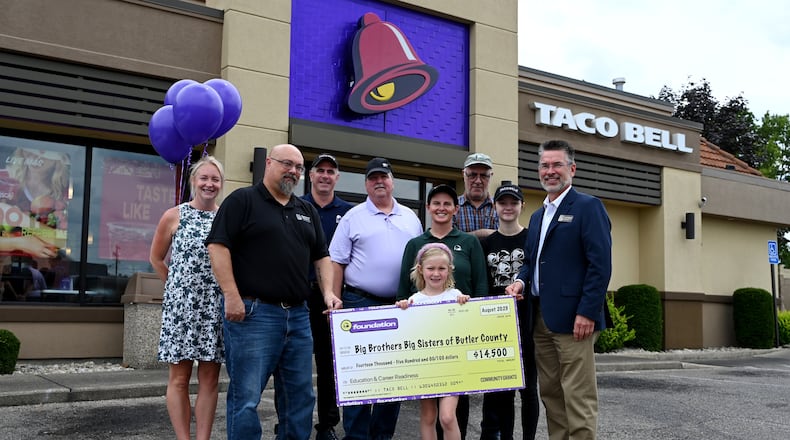That support recently came in the form of a community grant from the Taco Bell Foundation, which donated $14,500 to Big Brothers Big Sisters of Butler County. The grant funds were collected by customers rounding up their meal bills, the foundation said.
“Our teams ask the roundups every time a customer comes in, and we’ve raised, as a total brand (nationwide), $28 million this year in roundups,” said Jenny Wilber, a family representative of the Wilber family. The family owns a dozen Taco Bell restaurants around Southwest Ohio, including on High Street in Hamilton.
“It was a lot of pennies,” Wilber said.
Big Brothers Big Sisters of Butler County will use this money to support mental health through mentorship, helping youth in the county access essential resources to achieve their goals.
“By placing a mentor into the life of a child, that child now has somebody outside of their family, taking an active interest in their life. This is a person they grow to trust, and together, they build a close friendship,” said Stephens. “This child now has someone who is asking them about their grades, exposing them to new interests and activities and setting high expectations. The mentors help to build a positive sense of self, a sense of the future and healthy behaviors.”
Big Brothers Big Sisters is the oldest mentoring organization in the country as it’s more than 120 years old, with foundational roots in Cincinnati and New York City.
Changing lives
Mentoring pays big dividends when it comes to a child’s mental health, Stephens said.
“It’s really about changing people’s lives through relationships,” he said.
Being involved with the children, such as providing them with encouragement and support, changes lives.
And not just the children’s lives.
Organizations like Big Brothers Big Sisters are vital for those who don’t have a support system at home, but also for the mentors, said Deb Robison, Miami University’s director of Outreach and Collaboration at Ohio’s School-Based Center of Excellence for Prevention and Early Intervention.
“The mentors themselves really get something out of this. They get a sense of purpose,” she said. “It gives them a sense of doing something outside of themselves for the greater good.”
Mentoring is not as much about the amount of time as it is about the quality of time, Robison said.
Several years ago, Robison ran a lunch buddy mentoring program where local businesses around the school came and had lunch one day a week with the kids for 30 minutes.
“And you wouldn’t think that that would be enough time, but for some of these kids, they just blossom,” Robison said. “This was it. They had somebody that cared about them, that brought them their favorite snack. They were listened to. They were heard. It gave them that sense of somebody cares about me outside of myself. So it’s not so much about the amount of time as it is about the quality and the commitment to that student or that young person.”
Even more broadly, Robison said in the last 15 to 20 years, especially since the COVID pandemic, they’ve learned that not only should mental health be taken more seriously, but it’s part of a person’s overall health.
“Things dismissed before as simply a behavioral issue or maybe a child that was moody, we now are able to do a better job of engaging our teachers and our educational staff on recognizing the signs and symptoms of mental health so they can get them appropriate care,” she said.
Mentorship helps build resiliency
Stephens said mentorship is especially important with youth who have Adverse Childhood Experiences, or ACEs. Youth in the Big Brothers Big Sisters of Butler County’s program average more than four ACEs, which is more than 83% of the general population, according to the agency.
Mentorship works because the proof is in the data, Stephens said. Compared to their non-mentored peers, mentored children with Big Brothers Big Sisters of Butler County are less likely to begin using illegal drugs or alcohol, tend not to skip school or class and are more confident in schoolwork. They are also get along better with family members.
“Resiliency helps to overcome instances of abuse and neglect and provides benefit to a child’s mental health and well-being,” Stephens said. “Trauma-informed care focuses on prevention. Prevention is far more impactful than intervention. We use mentoring to build on success, not on deficits.”
This year, the Taco Bell Foundation awarded a record $28 million in community grants to nearly 500 nonprofit organizations supporting youth nationwide. The program is designed to uplift youth in communities, and franchises choose grant designees.
A mission of the foundation is to empower the youth, Taco Bell Foundation Executive Director Lisa Lane Cardin said, as that “is one of the most meaningful ways we can invest in the future.”
“This record investment is a testament to the power of community-driven change and the limitless potential that exists when we remove barriers and open doors,” she said.
BY THE NUMBERS
Mentorships help the community’s youth in a spectrum of ways, including reducing poor behavior. Boys and girls who are mentored by a Big Brother/Big Sister program are:
• 46% less likely to begin using illegal drugs, with minority youth being 70% less likely;
• 27% less likely to begin using alcohol;
• 32% less likely to report hitting someone in the last 12 months; and,
• 52% less likely to skip school and 37% less likely to skip class.
Additionally, youth who receive mentorship are more confident of their performance in schoolwork and get along better with their families.
SOURCE: BBBS of Butler County


